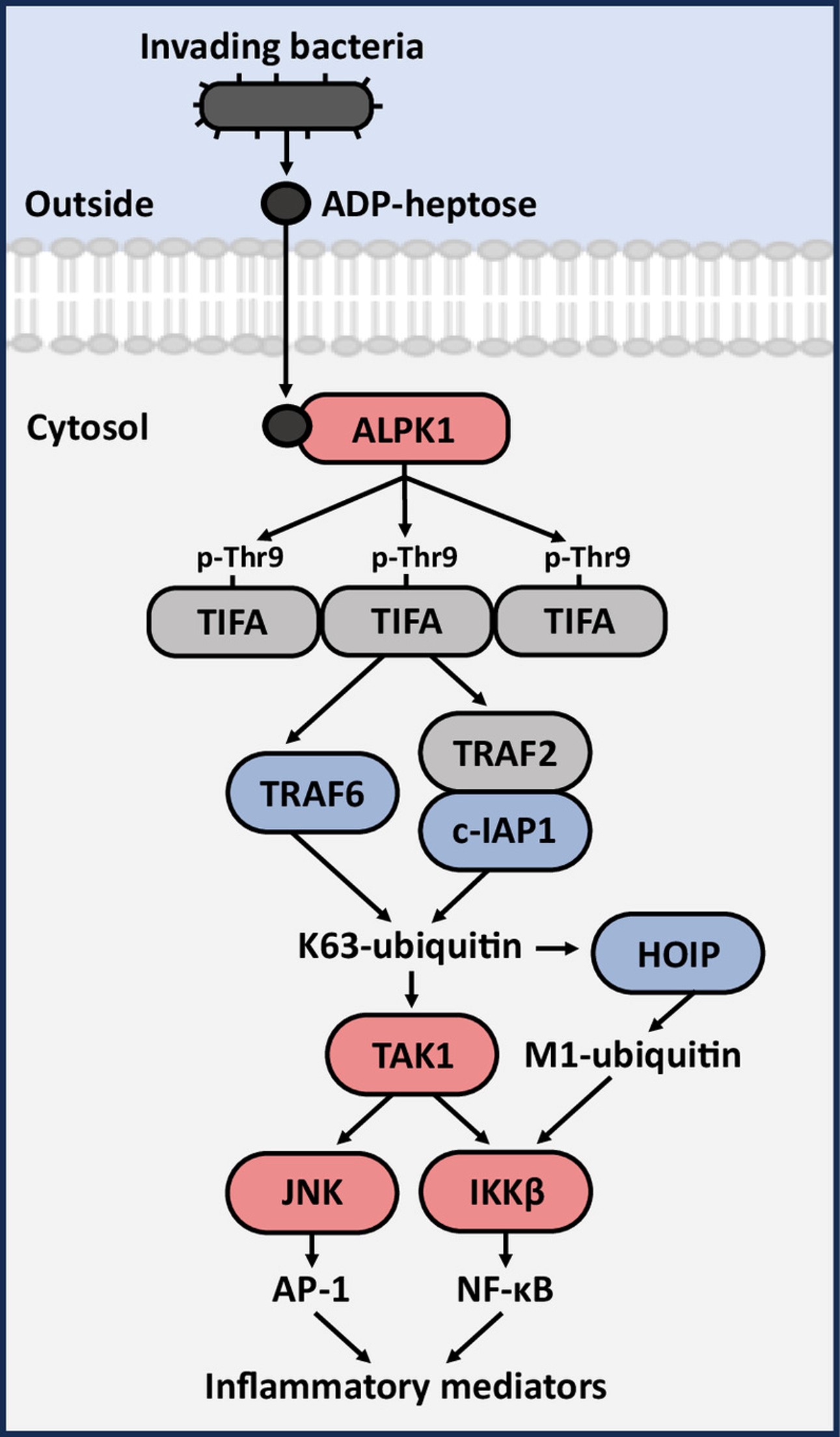
Tom Snelling a postdoctoral researcher in Philip Cohen’s lab has been awarded the Howard Elder Prize for a paper entitled “ALPK1 mutants causing ROSAH syndrome or Spiradenoma are activated by human nucleotide sugars”. The Howard Elder Prize is awarded to either a postgraduate student or postdoctoral researcher from the School of Life Sciences deemed to have published the most significant paper in an area related to cancer research.
The paper was published in December 2023 in Proceedings of the National Academy of Sciences 120, e2313148120
https://www.pnas.org/doi/10.1073/pnas.2313148120
Alpha protein kinase 1 (ALPK1) is the key component of an innate immune signalling pathway discovered only five years ago. In this pathway the activation of ALPK1 by the bacterial metabolite ADP-heptose enables ALPK1 to phosphorylate TIFA and recruit a signalling complex that leads to production of the inflammatory mediators needed to combat bacterial infection (see Figure). However, In 2019, it became clear that mutations in ALPK1 cause two human diseases. The ALPK1[Val1092Ala] mutation accounts for 40% of cases of Spiradenoma, which are abnormal growths usually on the head, neck or upper body) which can metastasize to Spiradenocarcinomas that are invariably fatal. In contrast the ALPK1[Thr237Met] mutation causes ROSAH syndrome, a disease that results in destruction of the retina and blindness at an early age.
 Like wild type ALPK1, the disease-causing mutants are inactive in the absence of ADP heptose and activated by ADP-heptose. However, Tom working with Anton Saalfrank, a Master’s student, discovered that in contrast to wild type ALPK1, the disease-causing mutants are also activated by sugar nucleotides present in mammalian cells. For example, the Spiradenoma/Spiradenocarcinoma-causing mutant is activated by GDP-mannose, UDP mannose and ADP-ribose but wild type ALPK1 is not. Activation by these sugar nucleotides is abolished by the further mutation of Arg153 to Ala, which disables the ADP-heptose binding site.
Like wild type ALPK1, the disease-causing mutants are inactive in the absence of ADP heptose and activated by ADP-heptose. However, Tom working with Anton Saalfrank, a Master’s student, discovered that in contrast to wild type ALPK1, the disease-causing mutants are also activated by sugar nucleotides present in mammalian cells. For example, the Spiradenoma/Spiradenocarcinoma-causing mutant is activated by GDP-mannose, UDP mannose and ADP-ribose but wild type ALPK1 is not. Activation by these sugar nucleotides is abolished by the further mutation of Arg153 to Ala, which disables the ADP-heptose binding site.
Spiradenoma and ROSAH syndrome may be the first examples of diseases cause by loss of specificity of an enzyme for its allosteric activator and can explain how the diseases arise in the absence of any bacterial infection. https://www.ppu.mrc.ac.uk/news/first-diseases-caused-loss-specificity-kinase-its-allosteric-activator
They also suggest a simple way to screen for small molecule inhibitors of the disease-causing mutants of ALPK1 that do not inhibit wild type ALPK1 and which may be used to treat these diseases.

